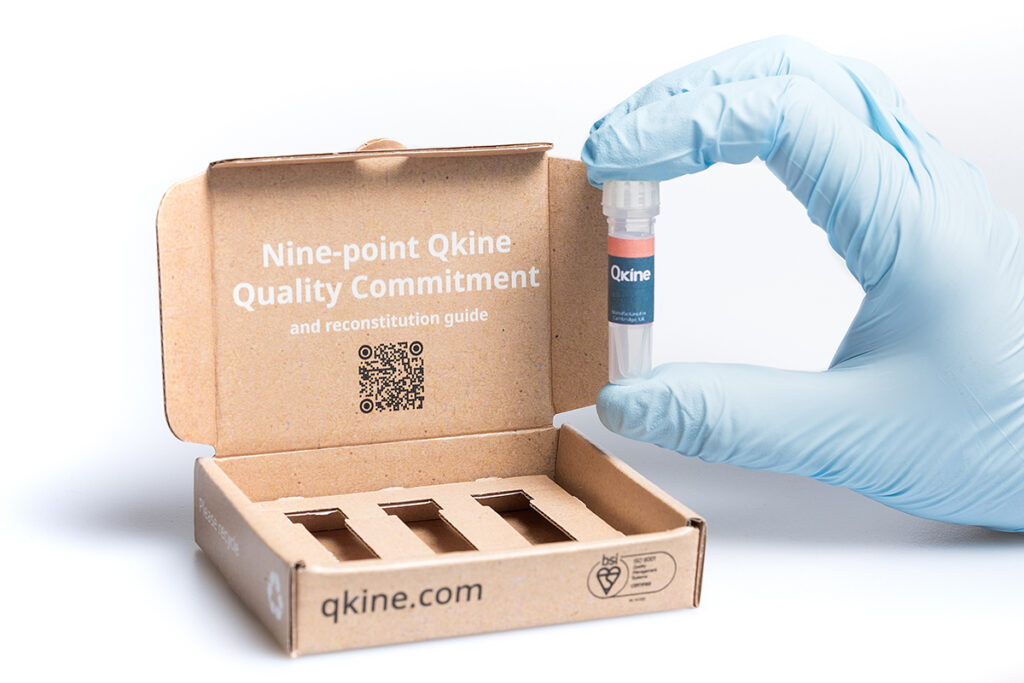Qkine are delighted that our eel FGF-2 proteins have elicited interest in Japan, recently the Nikkei Biotechnology & Business magazine have published an article focussing on the 145 and 154 amino acid versions of eel FGF-2, and the contribution Qkine species specific growth factors can have on the cultured seafood industry.
For our first fish growth factor range, we focused on three fish species: tuna, salmon and eel. Wild freshwater eels are known to be at risk of extinction due to overfishing and farming them is challenging due to their complex life-cycle, but they are an important fish in Japanese cuisine. The high price of good-quality eel allows cultivated fish companies to reach cost and taste parity with conventional fishing and be economically and commercially viable. We are focused on building a credible high quality food grade supply chain for growth factors to support the cultivated meat and fish sector, there is a lack of companies investing in building the research tools to help develop new fish cell culture processes at scale. Catherine Elton, Qkine CEO.
UK protein synthesis and sales company Qkine launches new FGF for cultured eels
The translated article reads:
‘On June 28, 2024, Qkine, a UK company that synthesizes and sells physiologically active proteins used in the cultivation of organoids and cellular foods, launched a new eel-derived recombinant FGF2 protein for use in the cultivation of eel cells. There is a high interest in cultivated eels in the development of cellular foods, and several overseas companies are developing them with an eye on the Japanese market. The company plans to sell the product to such companies. The company is a startup founded in 2016 at the University of Cambridge in the UK, and has strengths in synthesizing uniform proteins that do not contain animal-derived components through microbial cultivation. To date, it has released a variety of proteins for humans, mice, rats, etc. It also sells its products to Japanese researchers through distributors and direct sales.’ Original article
The translated article continues:
‘The company has launched eel-derived recombinant FGF2 “Qk106” and “Qk107”. Qk106 and Qk107 have different numbers of amino acid residues, with Qk106 having 145 amino acid residues and Qk107 having 154 amino acid residues, and they are used depending on the cell line being cultured. On the product sales page, the company explains that “the binding and activity of proteins to receptors varies depending on the animal species, and by using proteins specific to the animal species of the cells being cultured, the amount of additives can be reduced.” The company’s CEO, Catherine Elton, says, “We are committed to supporting the cellular food industry because cellular foods can bring sustainability to the world and address issues such as the depletion of biological resources and environmental destruction.” When asked why they focused on cultured eels, Catherine said, “Eels have a complex life history and are difficult to farm, but they are an important food source in Japan, and because they are expensive, we believe there is a high probability of commercialization.” Original article
Catherine Elton, Qkine CEO added:
‘All our proteins are exceptionally high purity and bioactivity and are manufactured in a certified animal origin-free production process using microbial fermentation. For some proteins, we proactively make new forms of growth factors using protein engineering to allow them to be made in an animal origin-free process, improve their biological activity or increase performance in culture. We are a scientist-led company so we provide exceptional levels of quality assay data and expertise and ensure this is available to our customers. Protein tags, small additional parts of the protein that are not in the natural protein and are used for purification or to enhance expression, are not present in our final proteins, unlike many proteins available commercially. This ensures the production process is highly scalable and removes scientific uncertainty.’
Recombinant eel FGF-2 145 aa (Qk106) and 154 aa (Qk107) are available in our high quality food grade range with full documentation including CoA, CoO and allergen statements:
Recombinant eel FGF-2 (145aa) protein (Qk106-FG)
Recombinant eel FGF-2 (154aa) protein (Qk107-FG)
